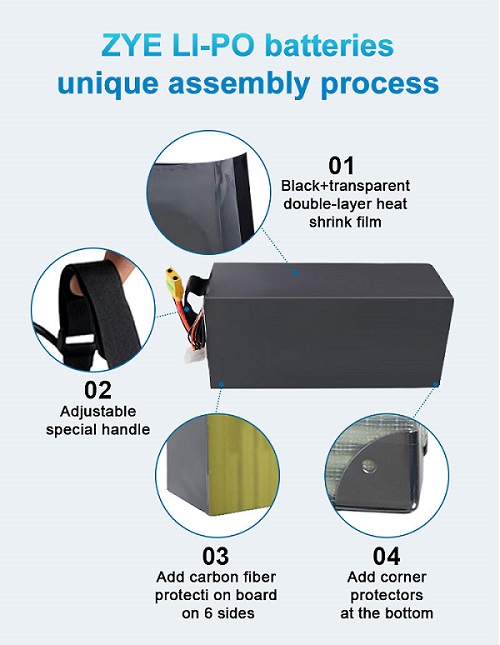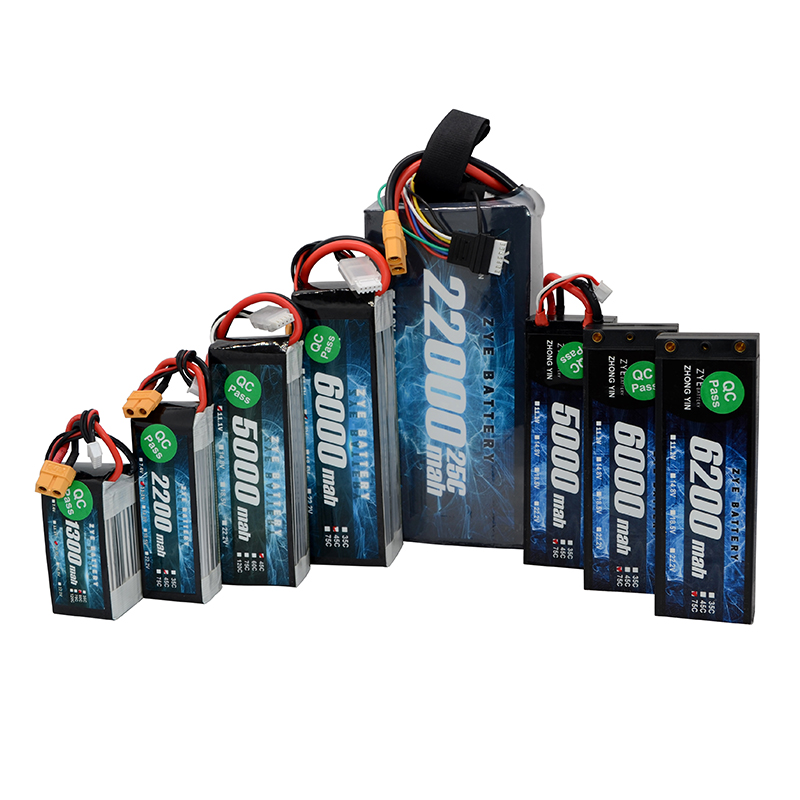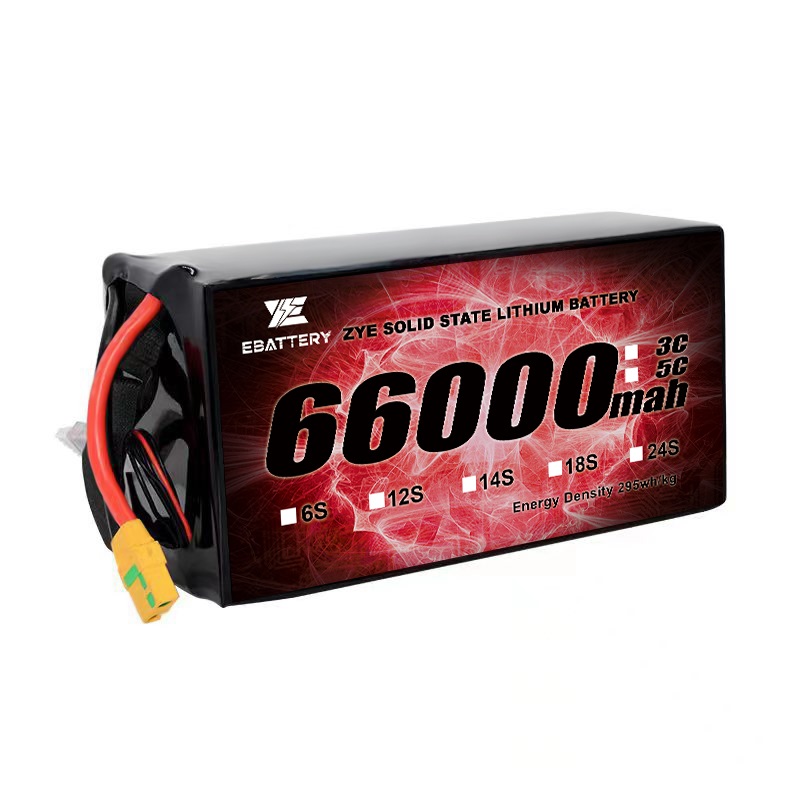How to dispose a lipo battery?
2025-03-03
Lithium Polymer (LiPo) batteries have become ubiquitous in our daily lives, powering everything from smartphones to electric vehicles. However, when these batteries reach the end of their lifecycle, proper disposal is crucial for both safety and environmental reasons. This article will guide you through the process of safely disposing of LiPo batteries, with a focus on high-capacity batteries like the 22000mah 12s lipo battery.
Safe Disposal Methods for 22000mah 12s Lipo Batteries
Disposing of a 22000mah 12s lipo battery requires careful consideration due to its high capacity and potential risks. Here are some safe methods to dispose of these powerful batteries:
1. Complete Discharge
Before disposal, it's essential to fully discharge the battery. For a 22000mah 12s lipo battery, this process may take longer due to its high capacity. Use a dedicated LiPo discharger or a resistor load to safely bring the voltage down to zero. This step is crucial as it eliminates the risk of electrical discharge during the disposal process.
2. Recycling Centers
Many electronics stores and battery retailers offer recycling services for LiPo batteries. These centers are equipped to handle high-capacity batteries like the 22000mah 12s variant. They ensure that valuable materials are recovered and harmful components are disposed of properly.
3. Manufacturer Take-Back Programs
Some battery manufacturers offer take-back programs for their products. Check if the manufacturer of your 22000mah 12s lipo battery provides such a service. These programs often ensure the most appropriate and environmentally friendly disposal methods.
4. Hazardous Waste Collection Events
Many communities organize hazardous waste collection events where you can safely dispose of LiPo batteries. These events are particularly useful for disposing of high-capacity batteries that may not be accepted at regular recycling centers.
5. Salt Water Method (For Emergency Use Only)
In cases where professional disposal options are not immediately available, the salt water method can be used as a last resort. Submerge the battery in a container of salt water for several weeks to fully discharge it. However, this method should only be used in emergencies and for smaller batteries, not for high-capacity ones like the 22000mah 12s lipo battery.
Why Proper Disposal of Lipo Batteries is Crucial
Understanding the importance of proper LiPo battery disposal is key to ensuring safety and environmental protection. Here's why it matters:
Safety Concerns
LiPo batteries, especially high-capacity ones like the 22000mah 12s lipo battery, contain volatile chemicals that can pose significant safety risks if not handled correctly. Improper disposal can lead to:
- Fire hazards: LiPo batteries can ignite if punctured or exposed to high temperatures.
- Explosions: Damaged or improperly discarded batteries may explode, causing injury or property damage.
- Chemical leaks: The electrolytes in LiPo batteries are corrosive and can cause harm if they come into contact with skin or eyes.
Legal Compliance
Many jurisdictions have strict regulations regarding the disposal of electronic waste, including LiPo batteries. Failing to comply with these regulations can result in hefty fines and legal consequences. It's crucial to familiarize yourself with local laws concerning battery disposal.
Resource Conservation
LiPo batteries contain valuable materials that can be recycled and reused. Proper disposal ensures that these resources are recovered, reducing the need for new raw materials and minimizing environmental impact.
Protecting Wildlife
When batteries end up in landfills, they can leak harmful chemicals into the soil and water, posing a threat to local ecosystems and wildlife. By disposing of batteries correctly, we help protect the natural environment and its inhabitants.

Environmental Impact of Incorrectly Disposing Lipo Batteries
The environmental consequences of improper LiPo battery disposal are far-reaching and long-lasting. Let's explore the potential impacts:
Soil Contamination
When LiPo batteries are discarded in regular trash, they often end up in landfills. Over time, the outer casing of the battery can degrade, allowing the internal chemicals to leach into the soil. This contamination can have several negative effects:
- Altered soil chemistry, making it unsuitable for plant growth
- Accumulation of heavy metals in the soil, which can be taken up by plants and enter the food chain
- Long-term degradation of soil quality, affecting local ecosystems
Water Pollution
The chemicals from improperly disposed LiPo batteries can seep into groundwater or be carried by rainwater into rivers and lakes. This can lead to:
- Contamination of drinking water sources
- Harm to aquatic life, including fish and underwater plants
- Disruption of entire aquatic ecosystems
Air Pollution
When LiPo batteries are incinerated along with regular waste, they release toxic fumes into the air. These emissions can contribute to:
- Increased air pollution and smog
- Respiratory issues in humans and animals
- Contribution to greenhouse gas emissions
Impact on Wildlife
The environmental contamination caused by improper battery disposal can have severe consequences for wildlife:
- Poisoning of animals that ingest contaminated soil or water
- Bioaccumulation of toxins in the food chain, affecting predators at higher trophic levels
- Habitat destruction due to long-term environmental degradation
Resource Depletion
LiPo batteries contain valuable and finite resources, including lithium, cobalt, and other metals. When these batteries are not recycled:
- We lose the opportunity to recover and reuse these materials
- More raw materials need to be mined, leading to further environmental degradation
- The overall sustainability of battery production is compromised
Long-Term Environmental Consequences
The environmental impact of improperly disposed LiPo batteries can persist for decades or even centuries. This long-term effect includes:
- Persistent chemical pollution in ecosystems
- Altered biodiversity in affected areas
- Potential health risks for future generations
Given these significant environmental impacts, it's clear why proper disposal of LiPo batteries, especially high-capacity ones like the 22000mah 12s lipo battery, is not just a matter of compliance but a crucial step in environmental stewardship.
The Role of Consumers in Responsible Battery Disposal
As consumers, we play a vital role in mitigating the environmental impact of LiPo batteries. By choosing to dispose of our batteries responsibly, we can:
- Reduce the amount of hazardous waste in landfills
- Support recycling initiatives that recover valuable materials
- Encourage manufacturers to develop more sustainable battery technologies
- Set a positive example for others in our community
Remember, every battery disposed of correctly is a step towards a cleaner, safer environment. Whether you're dealing with a small LiPo battery from a smartphone or a large 22000mah 12s lipo battery from an RC vehicle, the principles of responsible disposal remain the same.
Educating Others on Proper Battery Disposal
Spreading awareness about the importance of proper LiPo battery disposal is crucial. Here are some ways you can help educate others:
- Share information about local recycling programs and hazardous waste collection events
- Discuss the environmental impacts of improper battery disposal with friends and family
- Encourage local schools and community centers to host educational sessions on electronic waste management
- Support and promote businesses that offer battery recycling services
By taking these steps, we can collectively work towards a more sustainable approach to battery use and disposal, ensuring a healthier environment for generations to come.
Remember, proper disposal of LiPo batteries is not just a responsibility – it's an opportunity to make a positive impact on our planet. Let's work together to ensure that our use of these powerful energy sources doesn't come at the cost of our environment.
Are you ready to take the next step in responsible battery usage and disposal? At ZYE, we're here to help. Whether you need advice on disposing of your 22000mah 12s lipo battery or want to learn more about our environmentally friendly battery options, we're just an email away. Contact us at cathy@zyepower.com today and join us in our commitment to a greener future.
References
1. Johnson, A. (2022). "The Complete Guide to LiPo Battery Disposal". Battery Safety Journal, 15(3), 45-62.
2. Smith, R. & Brown, T. (2021). "Environmental Impacts of Lithium Polymer Batteries". Environmental Science & Technology, 55(8), 4321-4335.
3. Green, E. (2023). "Recycling High-Capacity LiPo Batteries: Challenges and Solutions". Waste Management & Research, 41(2), 189-205.
4. Lee, S. et al. (2022). "Consumer Awareness and Practices in Electronic Waste Disposal". Journal of Consumer Behavior, 20(4), 567-582.
5. White, M. (2023). "Innovations in Battery Recycling Technologies". Sustainable Materials and Technologies, 32, e00295.
























































